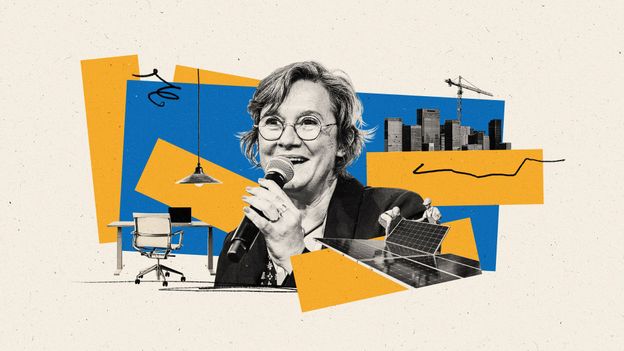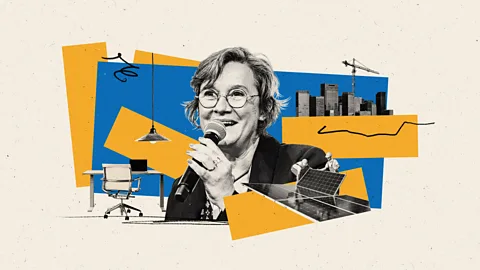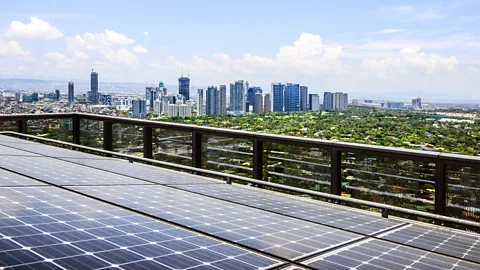
How EcoVadis is holding global corporations accountable
[ad_1]
 Klawe Rzeczy
Klawe RzeczyValérie Busser-Touchon, chief impact officer of EcoVadis, enters the BBC’s Executive Lounge to talk about how corporate social responsibility and business goals don’t have to be at odds.
Sustainability and business decisions are no longer separate concerns. Amid increasing government legislation on climate disclosure – and pressure from shareholders and consumers – companies are increasingly encouraged to make decisions with sustainability in mind. Leaders need to understand their impact on the planet and society – and what they must do next to reach their goals.
EcoVadis provides that insight into business’s environmental, labour and human rights, ethics and sustainable procurement practices, granting them ratings. Its platform now has more than 125,000 companies across the globe that are either being rated or rating themselves, including Johnson & Johnson, L’Oréal, Unilever and Salesforce.
Valérie Busser-Touchon has been with EcoVadis from its creation in 2007, and now serves as the company’s chief impact officer. With more than 30 years of international experience in sales development and management, she leads EcoVadis’s efforts to measure the positive impact of its own operations – ensuring the company continues helping businesses to reduce risks and navigate the complexities of sustainable practices.
“Taking corporate social responsibility into consideration is not an option,” Busser-Touchon tells the BBC. “It’s something that is absolutely needed and mandatory for a company’s health, and for the health of the world.”
Busser-Touchon discusses her leadership role, the challenges she has faced and offers guidance to fellow leaders within the sustainability sector.
Executive Lounge
The BBC’s series features interviews with C-suite leaders making innovative, data-driven decisions helping shape the future of business – and paving the path for other leaders to thrive.
What are some of the biggest challenges you think leaders will face reaching their corporate sustainability goals?
There can be tension between corporate sustainability goals and financial goals. We see it nowadays with economic, inflation and geopolitical issues disrupting the supply chain and it can be challenging for leaders to maintain full commitment to corporate sustainability goals while making sure the company is financially sound and is able to reach its financial target.
The rules of the market and the requirements for corporate social responsibility are not always aligned, and when they don’t align, it’s complex. However, in a number of cases, the two goals are aligned.
For instance, if you look at removing CO2 from the atmosphere, for companies, it translates to being more efficient in the way we use energy. So, at the end of the day, it’s a case-by-case decision to be made by leaders on the topics they have to solve.
How can leaders best manage this complex issue?
If I had a magic wand, I’d use it, because there are many things we can think about, but the rules of the market are capitalistic, and we cannot change those rules. Leaders need to align to take the best out of capitalistic rules and be able to, for instance, find investments to finance the transition to renewable energy.
But it’s not black or white. In some situations, you simply have to slow down before you make certain decisions. But the problem with climate change for example, is that it’s a threat that is not improving. So, I don’t know how much time we have to solve this issue and that’s maybe the question we should ask ourselves while making certain decisions as leaders.
 Getty Images
Getty ImagesData drives a lot of the decision making within the sustainability sector, but when you’re working with other executives who don’t necessarily want to make data-based decisions, how do you move forward?
The world has matured quite a bit and now making decisions without using data on sustainability is not professional. Sustainability is about managing risk as well. If you’re a CEO of a company and you’re not looking at potential risks which are triggered by your environment, you’re not doing your job.
In today’s world, a CEO who is not looking at the possible impact of CO2 emissions raising or of social inequalities, is not doing their job. Leaders have to take these things into consideration from a risk perspective.
The most mature leaders are looking at sustainability as a way to deliver positive impact, to be more competitive and more innovative. I think leaders should pay attention to sustainability to cover their risk because it’s part of the job and it can have financial impacts if you don’t.
What about your background led you to EcoVadis?
I’ve been working in innovative, newly created markets and ventures my whole life, so where I’m comfortable is educating people on a new topic or vision.
Also, I think my job now came out of guilt.
I don’t know if that’s a positive way to enter a new business, but I have three kids and when I realised what my generation and the generation before has done to negatively impact our planet, for instance, climate change – I said, maybe I should do something. Maybe I should participate in something that will bring more sustainable practices in the economy.
EcoVadis’s impact by the numbers
How do your own ethics and purpose affect the way you tackle tough leadership decisions or lead in general?
At EcoVadis, we are impregnated by our values and our belief system. Ninety percent of my decisions are made based on my values, and it hasn’t happened that frequently in my professional life where I was confronted with something that really went against them. If so, I’d be tempted to say I would not compromise, especially if it’s touching something that’s very important to me but I also know that sometimes you need to compromise.
So, I wouldn’t like to deliver an answer that is too assertive, because sometimes you have to make a decision out of respect – to respect people, to respect their beliefs, to respect their job, to respect the customer and sometimes there are no good decisions but you have to make them because you are the leader.
How has your leadership style evolved generally since you started your career to now being a chief impact officer of a global company?
I’m nicer. The more you age, the more experience you have and the easier it is to help people grow. I’m a strong believer that the more performing your teams are, the better you are, so I’m spending more time growing my team.
Secondly, work is work and learning to keep a bit of distance is extremely important. You also have a family, you have friends, you have a life and it’s important to have a balanced life. If not, you will quickly feel overwhelmed. My kids have helped me do this. When you have three kids, you have to manage your priorities because otherwise you won’t be able to juggle everything.
Is being a chief impact officer for a global sustainability company a title you’re proud of?
I’m extremely proud. It’s a beautiful job even if it’s not always easy.
I’m proud because my kids are very proud of me. When they tell me, “Mommy, what you’re doing is great,” that makes all the difference. My kids are very eco conscious so the fact that they know my work is about trying to help companies transform their business practices in response to climate change, for instance, that’s something they like.
I’m happy with it as well. The purpose of the company, which is to guide all companies toward a sustainable world, is a purpose I believe in.
This interview has been edited and condensed for clarity.
[ad_2]
Source link





